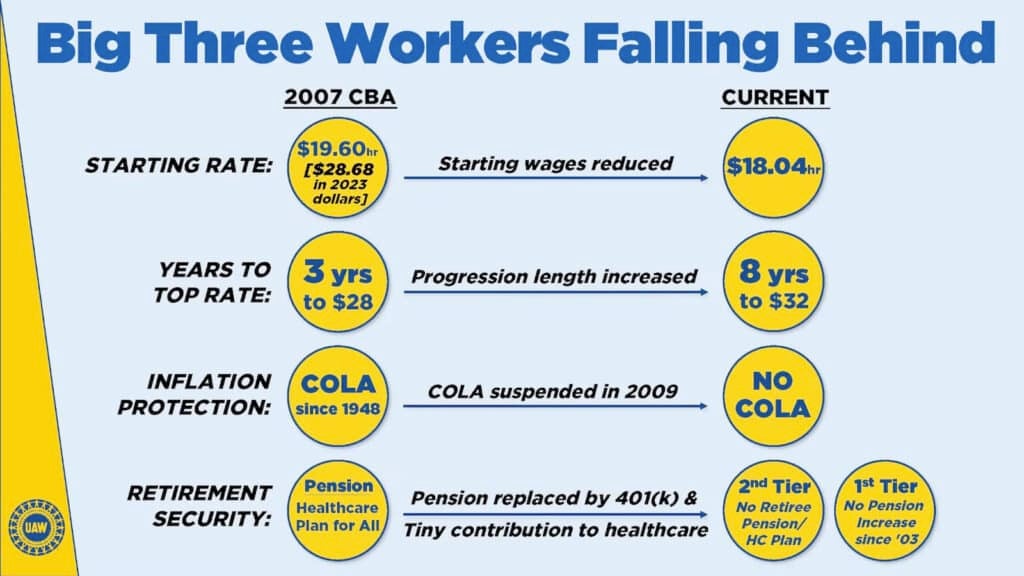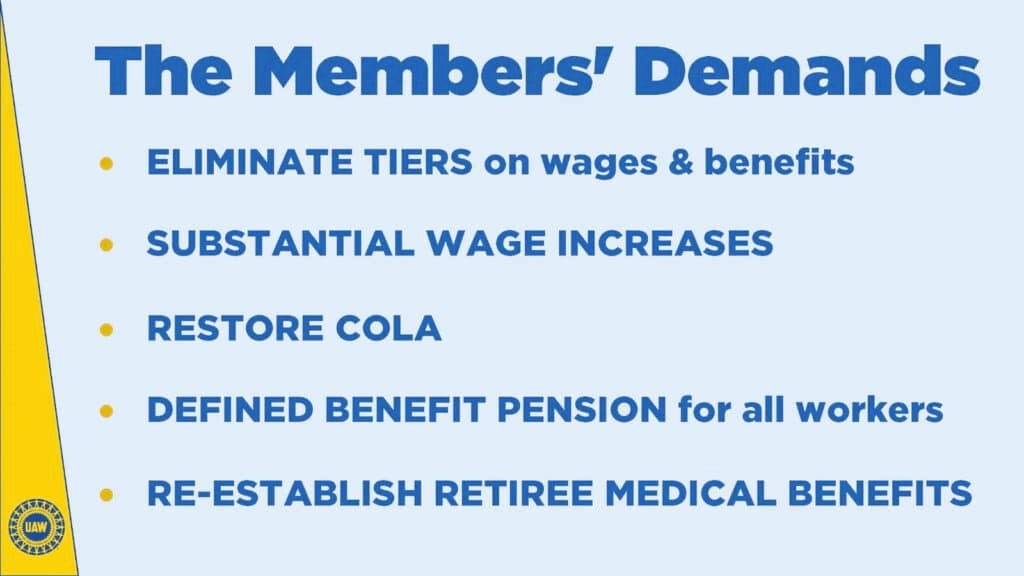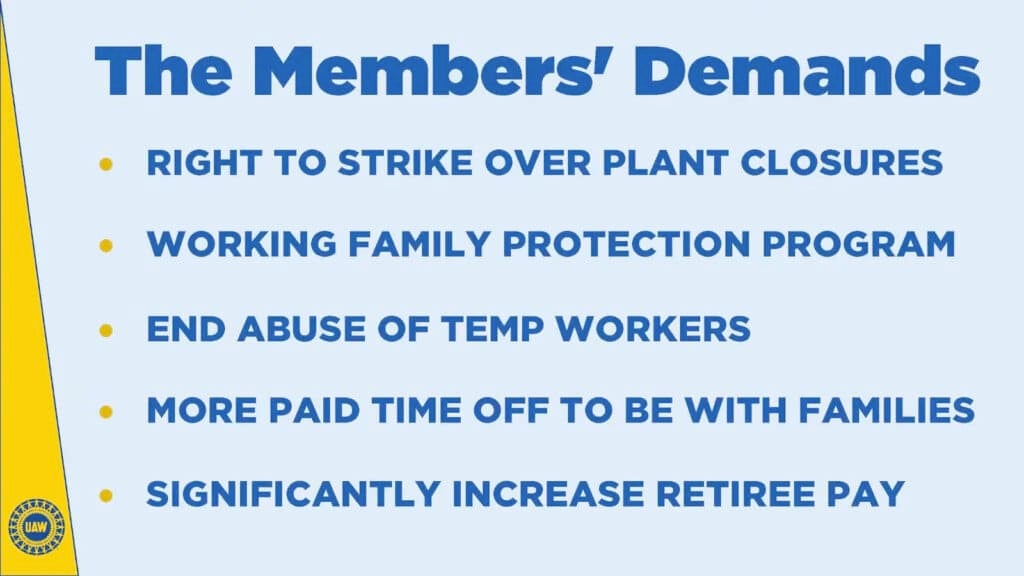The United Auto Workers is demanding an end to the tiered wage scale and a restoration of cost-of-living protection as well as a “substantial” pay increase along with a defined benefit pension plan for younger workers.

This is just the start of the list they’ve put forth.
The union also wants the next contracts with General Motors, Ford Motor Co. and Stellantis to include additional time off, and curtail the use of temporary workers, UAW President Shawn Fain said during a Facebook live appearance, later adding payments to retired workers also must be increased.
Some of the demands are “additive” to the initial list of requirements the union submitted, according to one executive involved with the talks exclusively told TheDetroitBureau.com. The cost of the demands amounts to $30 billion per automaker over the life of the contract.
Fain appears to be positioning the union to have the equivalent of a 32-hour work week, once the demands for additional vacation and holiday time and other allowances for time off are factored into the deal, the executive told TheDetroitBureau.com.
Stellantis offers reply
Stellantis, which is thought to be the union’s top target, was the first company to which Fain presented the UAW demands and the company said it had a “very productive” meeting.
“The Demands are consistent with the priorities he has previously outlined, but we will continue to review them to understand how they align with our Company proposals and where we can find common ground,” the company said in a statement.
“Stellantis and the UAW have a shared interest in these negotiations: securing the future of our 43,000 employees and their families. We have been clear from the start that we are not seeking a concessionary agreement.

“As we have done for more than 70 years, we will work constructively and collaboratively with the UAW to find solutions that will result in a contract that is competitive in the global market, responsibly addresses employee concerns and meets the needs of our customers.”
GM and Ford have yet to respond.
Fain’s ambitious goals
Fain described the union’s demands as “ambitious and audacious,” but said they are necessary to reverse the long slide in the standard of living of autoworkers.
Since 2007, UAW members have not only lost cost-of-living protection, but also the starting wage has been reduced substantially. It now takes eight years to reach the top of pay scale for an assembler of $32 per hour. At the beginning of the century, it took only three years and workers would grow into a defined benefit pension plan, which was eliminated for new workers in 2007.
Most new workers now start out as temporary workers making $16 per hour, but even the current starting wage of $19.60 per hour has been eroded by inflation. If cost-of-living increases had been in place, the starting wage at Ford, GM and Stellantis would now be $28.68 per hour, Fain said.
The current UAW contracts also created multiple “tiers,” so anyone employed at different component plants or in warehouses are paid less than the $32 per hour assemblers now make in the company’s big factories.

But the International Brotherhood of Teamsters tentative agreement with UPS eliminates the tiered wage structure for full-time employees, Fain said.
The automakers, despite collecting billions of dollars in government subsidies, are now encouraging a “race to the bottom” in the new auto industries new battery plants, Fain said. Workers at the new Ultium plant in Ohio start at $16 per hour despite the hazards inherent in working in the plant, Fain said.
Detroit’s three automakers have closed 65 different facilities since the 1990s, placing an enormous strain an hourly worker and the communities in which they live, and the union wants the right to strike anytime a company threatens to shut a plant.
When a plant is closed, workers are left with three options, none of which are good. They can retire if they are eligible, they can uproot their families and move to another town or they can quit, he said.
Executive pay increases inequality
At the same time top executives in the auto industry are making huge salaries and using company-funded stock buybacks to further enrichment — and Fain is using it to rally the troops.
GM Chair and CEO Mary Barra made $29 million in 2022. It would take a worker at the Ultium Cell battery plan in Northeast Ohio 16 years to make what Barra makes in one week, he noted.
Fain also emphasized he is not the author of the union’s economic demands. “I am telling them these are the members demands,” said Fain.

Detroit’s three automakers have made enormous profits during the past decade, and they are tracking to make substantial profits again this year, and the union is prepared for the companies to claim the union’s demands will cost too much.
The cost is not the issue, he said, fairness is.
The UAW President said 30 Democratic Senators led by Sherrod Brown (D-Ohio) and Dick Durbin (D-Illinois) signed a letter, supporting the UAW’s demands. Debbie Stabenow (D-Michigan) and Gary Peters (D-Michigan) signed their own separate letter supporting the union’s demands.
Fain acknowledged he was breaking with what up until now had been the standard practice of having the unions leaders present the UAW’s economic demands behind closed doors and keep them shrouded in secrecy.
By publicizing the union’s demands, Fain said he wanted to make the talks more transparent for union members, who have every reason to mistrust the UAW leadership after the scandals of recent years.
“We got a huge fight ahead of us,” he said. “We’re going to prevail come hell or high water.”
- SEO Powered Content & PR Distribution. Get Amplified Today.
- PlatoData.Network Vertical Generative Ai. Empower Yourself. Access Here.
- PlatoAiStream. Web3 Intelligence. Knowledge Amplified. Access Here.
- PlatoESG. Automotive / EVs, Carbon, CleanTech, Energy, Environment, Solar, Waste Management. Access Here.
- BlockOffsets. Modernizing Environmental Offset Ownership. Access Here.
- Source: https://www.thedetroitbureau.com/2023/08/uaw-puts-long-list-of-demands-on-negotiating-table-with-detroit-automakers/



